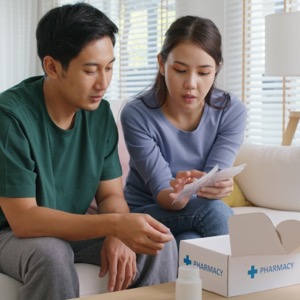Originally published by our sister publication Specialty Pharmacy Continuum
By Myles Starr
The federal government is no longer footing the bill for antiviral COVID-19 therapies for every American. The Department of Health and Human Services announced the implementation of a plan to smooth the transition to traditional ordering, distribution and payment for COVID-19 therapies for pharmacies, individuals, manufacturers and the health system at large.
“It is of paramount importance that these medications remain widely accessible to high-risk patients after commercial distribution begins in order to minimize hospitalizations and deaths from COVID-19,” HHS Secretary Xavier Becerra said in a letter to the public released Oct. 27, before the start of the transition.
Since Nov. 1, the distribution of two antiviral drugs used to treat COVID-19, molnupiravir (Lagevrio, Merck) and nirmatrelvir+ritonavir (Paxlovid, Pfizer), has begun to shift. These therapies are now in the process of being made available for purchase through insurance programs, both private and governmental, like other drugs. In the meantime, HHS and manufacturers have implemented the following policies to avoid any sudden cost increase for people who cannot afford drugs to treat COVID-19:
• Through the end of 2024, people who are uninsured and those who have Medicare or Medicaid coverage will continue to receive nirmatrelvir+ritonavir with no out-of-pocket costs through Pfizer’s patient assistance program.
• The Department of Defense, Department of Veterans Affairs and Indian Health Service will retain access to federally acquired nirmatrelvir+ritonavir.
• To help ensure those with private insurance will maintain their access to nirmatrelvir+ritonavir, Pfizer is setting up a copay assistance program for individuals who will struggle to afford the drug. The new price tag for nirmatrelvir+ritonavir is $1,400, but under the new program the maximum out-of-pocket cost is $140.
• Similarly, Merck will set up a patient assistance program to ensure molnupiravir will be available for all patients who are not eligible for nirmatrelvir+ritonavir or remdesivir (Veklury, Gilead).
• All partners who have been managing U.S. government–purchased drugs can continue to use federally acquired product until it is depleted or until it expires, at no cost to patients. Furthermore, entities that order these medications can return unused drugs.
“The transition is happening but there is a long runway because there is still a lot of product out in the field that patients won’t have to pay for,” commented an HHS representative. “We have not seen, and are not expecting to see, supply and distribution issues.”
Although the plan has not encountered any hitches yet, HHS believes that further collaboration with payors, manufacturers and distributers will be necessary to maintain equitable access to these drugs. The agency has asked its partners to not only “find sustainable ways to enable continued visibility of the availability of therapeutics,” but also emphasized that sharing this information with government partners is “fundamental to maintaining our mutual commitment to [healthcare] equity.”

